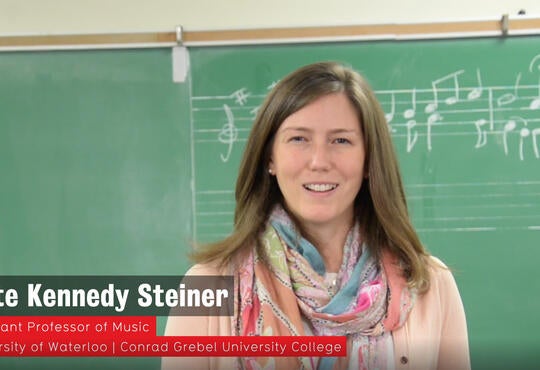Lowell Ewert, Associate Professor of Peace and Conflict Studies (PACS) at Grebel and the University of Waterloo, retired in July, leaving a distinguished 23-year legacy in collaborative and innovative teaching, interdisciplinary engagement, and active research.
“Lowell is a builder,” described PACS Chair Nathan Funk. “He’s one of those uncommon people who effectively links audacious vision with persistent, methodical, well-documented effort. Those who know Lowell recognize that he is dynamic, highly motivated, straight-forward, and accountable.”
Trained as a lawyer, Lowell researches the ways that peace interacts with human rights, law, and civil society. He has contributed many chapters and articles to peace and academic publications, has edited three books, and was a frequent and inspiring presenter at human rights-related conferences.
Lowell estimated that during his career, he has taught about 3,580 undergraduate students, supervised 160 undergraduates in independent study and internships, taught about 125 graduate students, and supervised 30 independent study and internships for graduate students.
This past spring, Lowell was honoured with a UWaterloo 2020 Distinguished Teacher Award. This award celebrates exemplary instructors with a record of teaching excellence over an extended period. In addition to intellectual rigour, criteria for the award include impact beyond the classroom, concern for students, and a favourable and lasting influence on students and colleagues. “These characteristics clearly mark Lowell’s teaching in the PACS Department,” said Grebel’s Dean Troy Osborne. “Those of us who have worked alongside Lowell have benefitted from his honest reflection on the craft of teaching and many of his students have remarked on the way that Lowell has changed their mind—and perhaps their career path. Lowell is a worthy recipient of this award.”
One key characteristic of Lowell’s exceptional teaching is his commitment to interdisciplinary study and promoting connections between subject areas to enhance student learning. This is exemplified in some of the courses he developed such as Peace and Disability, Peace and Policing, Math for Good and Evil, Peace is Everyone’s Business, Human Rights, and Peace and Business. As Director of PACS for 20 years, Lowell also cultivated this perspective in others and encouraged the creation of other interdisciplinary courses. “Lowell is consistently trying to learn new things and figure out what the next important area for reflection and practice might be,” explained Nathan. “Then he would often go and teach a course on that topic, collaboratively, exposing students to new ideas. Lowell’s current edited book project, Peace is Everyone’s Business, explores how peace figures into a full range of university disciplines and faculties, and is emblematic of this interdisciplinary engagement and creativity.”
“Lowell’s impact in the classroom is very evident,” added President Marcus Shantz, “but he was also a visionary director of the PACS program. He saw the linkages between academia, law, civil society, and business, and brought these insights to bear on the needs of our world.”
“I consider him the prime mover behind the rapid development and expansion of PACS,” added Nathan. Under Lowell’s leadership, the Certificate Program in Conflict Management was created in 1998, and in 2005, Grebel’s long-standing dreams for an academic major in PACS were realized. Seven years later, with steadily increasing enrolments and interest in the program, the Master of Peace and Conflict Studies degree was established. Lowell raised Grebel’s profile at Waterloo significantly by fostering interdisciplinary collaboration with a range of departments, by developing a professional development module for co-op students, by turning three 200-level courses into high-enrollment classes, by pioneering new courses that reflect areas of ongoing creativity within the Mennonite community, and by fostering collaboration with the Balsillie School of International Affairs. Without Lowell, Grebel’s footprint at the university and in the Waterloo region would be considerably smaller.
Reflecting on his personal teaching experiences, Lowell noted, “I often felt like I was on holy ground in the classroom as I listened to students wrestle with their convictions, core values, and explore how they wanted to live responsibly in this increasingly polarized and fractured world. Teaching is a profound and sacred privilege that I have been lucky to have had.”






